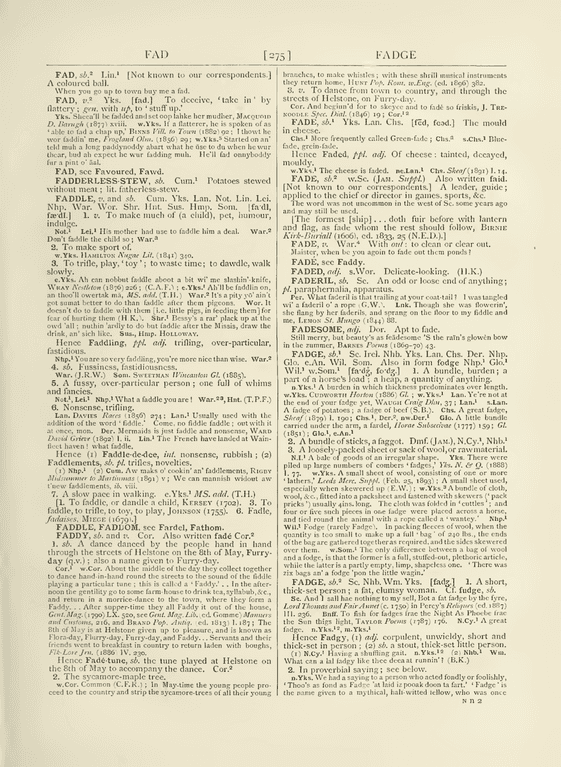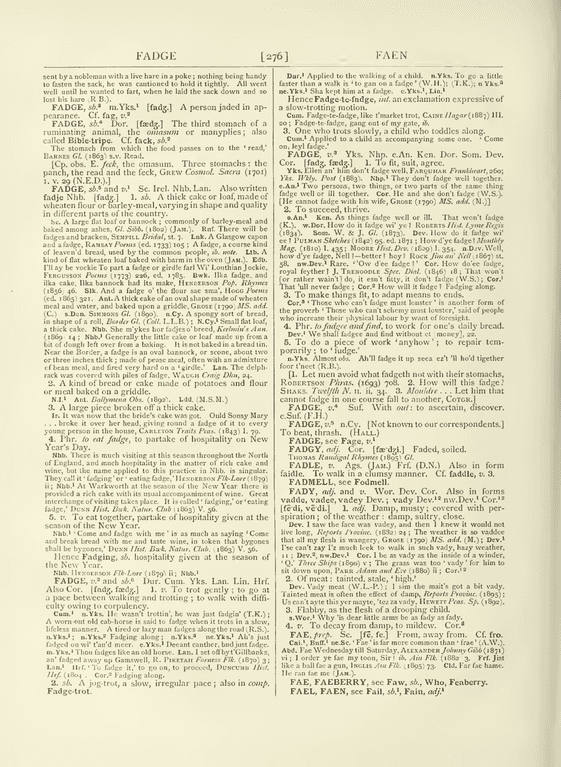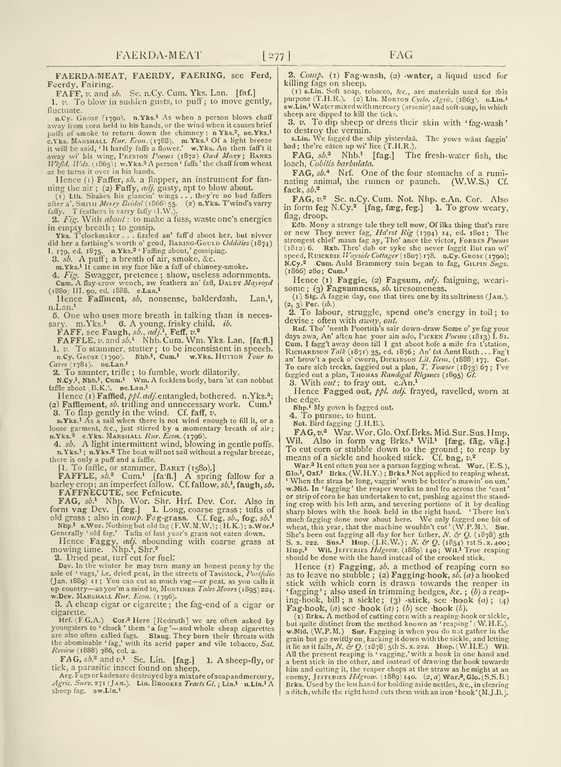Fadge
Source : Wright, Joseph English Dialect Dictionary web : https://eddonline4-proj.uibk.ac.at/edd/main.html
FADGE, sb.1 Sc. Irel. Nhb. Yks. Lan. Chs. Der. Nhp. Glo. e.An. Wil. Som. Also in form fodge Nhp.1 Glo.1 Wil.1 w.Som.1 [fa·dʒ, fo·dʒ.] 1. A bundle, burden; part of a horse's load; a heap, a quantity of anything. n.Yks.1 A burden in which thickness predominates over length. w.Yks. Cudworth Horton (1886) Gl.; w.Yks.1 Lan. Ye're not at the end of your fadge yet, Waugh Craig Dhu 37; Lan.1 s.Lan. A fadge of potatoes; a fadge of beef (S.B.). Chs. A great fadge, Sheaf (1879) I. 190; Chs.1, Der.2, nw.Der.1 Glo. A little bundle carried under the arm, a fardel, Horae Subsecivae (1777) 159; Gl. (1851); Glo.1, e.An.1 2. A bundle of sticks, a faggot. Dmf. (Jam.), N.Cy.1, Nhb.1 3. A loosely-packed sheet or sack of wool, or raw material. N.I.1 A bale of goods of an irregular shape. Yks. There were piled up large numbers of combers ‘fadges,’ Yks. N. & Q. (1888) I. 77. w.Yks. A small sheet of wool, consisting of one or more ‘lathers,’ Leeds Merc. Suppl. (Feb. 25, 1893); A small sheet used, especially when skewered up (E.W.); w.Yks.3 A bundle of cloth, wool, &c., fitted into a packsheet and fastened with skewers (‘ pack pricks’) usually 4ins. long. The cloth was folded in ‘cuttles’; and four or five such pieces in one fadge were placed across a horse, and tied round the animal with a rope called a ‘wantey.’ Nhp.1 Wil.1 Fodge (rarely Fadge). In packing fleeces of wool, when the quantity is too small to make up a full ‘bag’ of 240 lbs., the ends of the bag are gathered together as required, and the sides skewered over them. w.Som.1 The only difference between a bag of wool and a fodge, is that the former is a full, stuffed-out, plethoric article, while the latter is a partly empty, limp, shapeless one. ‘There was zix bags an' a fodge 'pon the little wagin.’
FADGE, sb.2 Sc. Nhb. Wm. Yks. [fadӡ.] 1. A short, thick-set person; a fat, clumsy woman. Cf. fudge, sb. Sc. And I sall hae nothing to my sell, Bot a fat fadge by the fyre, Lord Thomas and Fair Annet (c. 1750) in Percy's Reliques (ed. 1887) III. 236. Bnff. To fish for fadges frae the Night As Phoebe frae the Sun thigs light, Taylor Poems (1787) 176. N.Cy.1 A great fadge. n.Yks.1 n.Yks.2, m.Yks.1 Hence Fadgy, (1) adj. corpulent, unwieldy, short and thick-set in person; (2) sb. a stout, thick-set little person. (1) N.Cy.1 Having a shuffling gait. n.Yks.1 n.Yks.2 (2) Nhb.1 Wm. What can a lal fadgy like thee deea at runnin'? (B.K.) 2. In proverbial saying; see below. n.Yks. We had a saying to a person who acted fondly or foolishly, ‘Thoo's as fond as Fadge 'at laid iz pooak doon ta fart.’ ‘Fadge’ is the name given to a mythical, half-witted fellow, who was once sent by a nobleman with a live hare in a poke; nothing being handy to fasten the sack, he was cautioned to hold it tightly. All went well until he wanted to fart, when he laid the sack down and so lost his hare (R.B.).
FADGE, sb.3 m.Yks.1 [fadʒ.] A person jaded in appearance. Cf. fag, v.2
FADGE, sb.4 Dor. [fædʒ.] The third stomach of a ruminating animal, the omasum or manyplies; also called Bible-tripe. Cf. fack, sb.2 The stomach from which the food passes on to the ‘read,’ Barnes Gl. (1863) s.v. Read. [Cp. obs. E. feck, the omasum. Three stomachs: the panch, the read and the feck, Grew Cosmol. Sacra (1701) i. v. 29 (N.E.D.).]
FADGE, sb.5 and v.1 Sc. Irel. Nhb. Lan. Also written fadje Nhb. [fadʒ.] 1. sb. A thick cake or loaf, made of wheaten flour or barley-meal, varying in shape and quality in different parts of the country. Sc. A large flat loaf or bannock; commonly of barley-meal and baked among ashes, Gl. Sibb. (1802) (Jam.). Rnf. There will be fadges and bracken, Sempill Bridal, st. 7. Lnk. A Glasgow capon and a fadge, Ramsay Poems (ed. 1733) 105; A fadge, a course kind of leaven'd bread, used by the common people, RAMSAY Poems note. Lth. A kind of flat wheaten loaf baked with barm in the oven (Jam.) Edb. I'll ay be vockie To part a fadge or girdle farl Wi' Louthian Jockie, Fergusson Poems (1773) 226, ed. 1785. Bwk. Ilka fadge, and ilka cake, Ilka bannock had its make, Henderson Pop. Rhymes (1856) 46. Slk. And a fadge o' the flour sae sma', Hogg Poems (ed. 1865) 321. Ant. A thick cake of an oval shape made of wheaten meal and water, and baked upon a griddle, Grose (1790) MS. add. (C.) s.Don. Simmons Gl. (1890). n.Cy. A spongy sort of bread, in shape of a roll, Border Gl. (Coll. L.L.B.); N.Cy.1 Small flat loaf, a thick cake. Nhb. She m'ykes hor fadjes o' breed, Keelmin's Ann. (1869) 14; Nhb.1 Generally the little cake or loaf made up from a bit of dough left over from a baking. It is not baked in a bread tin. Near the Border, a fadge is an oval bannock, or scone, about two or three inches thick; made of pease meal, often with an admixture of bean meal, and fired very hard on a ‘girdle.’ Lan. The delphrack was covered with piles of fadge, Waugh Craig Dhu 24. 2. A kind of bread or cake made of potatoes and flour or meal baked on a griddle. N.I.1 Ant. Ballymena Obs. (1892). Ldd. (M.S.M.) 3. A large piece broken off a thick cake. Ir. It was now that the bride's cake was got. Ould Sonsy Mary... broke it over her head, giving round a fadge of it to every young person in the house, Carleton Traits Peas. (1843) I. 79. 4. phr. to eat fadge, to partake of hospitality on New Year's Day. Nhb. There is much visiting at this season throughout the North of England, and much hospitality in the matter of rich cake and wine, but the name applied to this practice in Nhb. is singular. They call it ‘fadging’ or ‘eating fadge,’ Henderson Flk-Lore (1879) ii; Nhb.1 At Warkworth at the season of the New Year there is provided a rich cake with its usual accompaniment of wine. Great interchange of visiting takes place. It is called ‘fadging,’ or ‘eating fadge,’ Dunn Hist. Bwk. Natur. Club (1863) V. 56. 5. v. To eat together, partake of hospitality given at the season of the New Year. Nhb.1 ‘Come and fadge with me’ is as much as saying ‘Come and break bread with me and taste wine, in token that bygones shall be bygones,’ Dunn Hist. Bwk. Natur. Club. (1863) V. 56. Hence Fadging, sb. hospitality given at the season of the New Year. Nhb. Henderson Flk-Lore (1879) 11; Nhb.1
FADGE, v.2 and sb.6 Dur. Cum. Yks. Lan. Lin. Hrf. Also Cor. [fadʒ, fædʒ.] 1. v. To trot gently; to go at a pace between walking and trotting; to walk with difficulty owing to corpulency. Cum.1 n.Yks. He wasn't trottin', he was just fadgin' (T.K.); A worn-out old cab-horse is said to fadge when it trots in a slow, lifeless manner. A tired or lazy man fadges along the road (R.S.). n.Yks.1; n.Yks.2 Fadging along; n.Yks.3 ne.Yks.1 Ah's just fadged on wi' t'au'd meer. e.Yks.1 Deeant canther, bud just fadge. m.Yks.1 Thou fadges like an old horse. Lan. I set off by t'Gillbanks, an' fadged away up Gamswell, R. Piketah Forness Flk. (1870) 3; Lan.1 Hrf. ‘To fadge it,’ to go on, to proceed, Duncumb Hist. Hrf. (1804). Cor.2 Fadging along. 2. sb. A jog-trot, a slow, irregular pace; Also in comp. Fadge-trot. Dur.1 Applied to the walking of a child. n.Yks. To go a little faster than a walk is ‘to gan on a fadge’ (W.H.); (T.K.); n.Yks.3 ne.Yks.1 Sha kept him at a fadge. e.Yks.1, Lin.1 Hence Fadge-te-fadge, int. an exclamation expressive of a slow-trotting motion. Cum. Fadge-te-fadge, like t'market trot, Caine Hagar (1887) III. 20; Fadge-te-fadge, gang out of my gate, CAINE Hagar 3. One who trots slowly, a child who toddles along. Cum.1 Applied to a child as accompanying some one. ‘Come on, leyl fadge.’
FADGE, v.3 Yks. Nhp. e.An. Ken. Dor. Som. Dev. Cor. [fadʃ, fædʃ.] 1. To fit, suit, agree. Yks. Ellen an' him don't fadge well, Farquhar Frankheart, 260; Yks. Wkly. Post (1883). Nhp.1 They don't fadge well together. e.An.1 Two persons, two things, or two parts of the same thing fadge well or ill together. Cor. He and she don't fadge (W.S.). [He cannot fadge with his wife, Grose (1790) MS. add. (M.)] 2. To succeed, thrive. e.An.1 Ken. As things fadge well or ill. That won't fadge (K.). w.Dor. How do it fadge wi' ye? Roberts Hist. Lyme Regis (1834). Som. W. & J. Gl. (1873). Dev. How do it fadge wi' ee? Pulman Sketches (1842) 95, ed. 1871; How d'ye fadge? Monthly Mag. (1810) I. 435; Moore Hist. Dev. (1829) I. 354. n.Dev. Well, how d'ye fadge, Nell? Fadge better? hoy? Rock Jim an' Nell (1867) st. 58. nw.Dev.1 Rare. ‘'Ow d'ee fadge?’ Cor. How do'ee fadge, royal feyther? J. Trenoodle Spec. Dial. (1846) 18; That won't [or rather wain't] do, it esn't fitty, it don't fadge (W.S.); Cor.1 That 'ull never fadge; Cor.2 How will it fadge? Fadging along. 3. To make things fit, to adapt means to ends. Cor.3 ‘Those who can't fadge must louster’ is another form of the proverb ‘Those who can't schemy must louster,’ said of people who increase their physical labour by want of foresight. 4. phr. to fadgee and find, to work for one's daily bread. Dev.1 We shall fadgee and find without et [money], 22. 5. To do a piece of work, ‘anyhow’; to repair temporarily; to ‘fudge.’ n.Yks. Almost obs. Ah'll fadge it up seea ez't 'll ho'd tigether foor t'neet (R.B.). [1. Let men avoid what fadgeth not with their stomachs, Robertson Phras. (1693) 708. 2. How will this fadge? SHAKS. Twelfth N. II. ii. 34. 3. Mouldre... Let him that cannot fadge in one course fall to another, COTGR.]
FADGE, v.4 Suf. with out: to ascertain, discover. e.Suf. (F.H.)
FADGE, v.5 n.Cy. [Not known to our correspondents.] To beat, thrash. (Hall.)
FADGE, see Fage, v.1
FADGE, v. Lakel.2 To shuffle.


